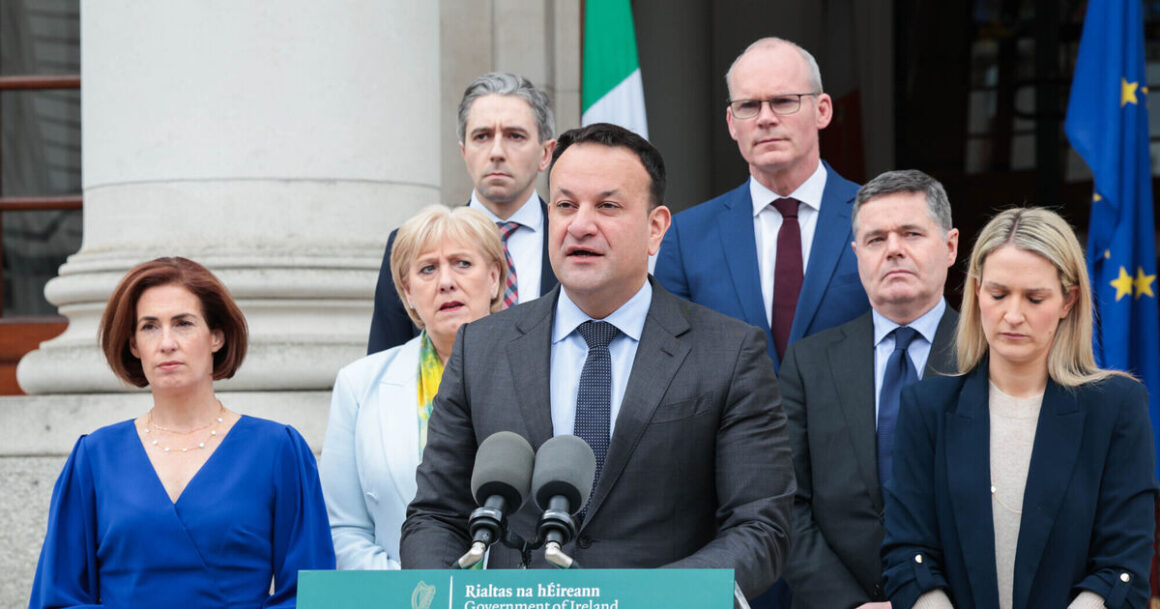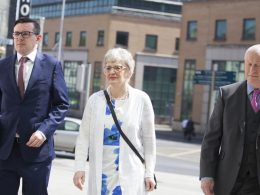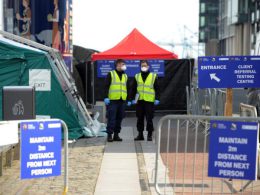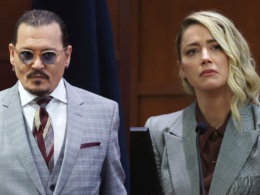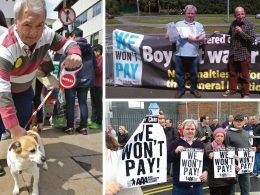By Jonathan Diebold
Leo Varadkar, a perennially out-of-touch politician, made the most in-touch decision of his career last week when he resigned as Taoiseach. His statement during the recent disastrous referendums that care shouldn’t be the state’s responsibility was only the latest in a long line of Leo saying the quiet part out loud.
A reflection of the underlying crisis within his party is shown by the fact that a third of sitting Fine Gael TDs have already declared that they will not stand in the next general election. This is the highest number of TDs from a ruling party to do so since 2011, when Fianna Fáil faced electoral obliteration against the backdrop of the most severe economic crisis in the state’s history. These are career politicians, not motivated by any serious convictions, certainly not for the interests of working-class people; if they can get an easier job in the corporate world they’ll take it.
Simon Harris anointed leader
Simon Harris is set to be the new Taoiseach after being anointed leader of Fine Gael. For anyone who doesn’t know, Harris’ record in office is an abysmal one. As Minister for Health he presided over a dysfunctional system. He slashed €12 million from the already disgracefully paltry €35 million mental health budget. He oversaw the second strike of nurses in since the foundation of the state and threatened to cut their wages while on strike. Paramedics were also forced to take industrial action under his watch against union busting by the HSE.
In 2017, Harris pledged that children with scoliosis and spina bifida would not have to wait more than four months for life-changing surgery; this was a promise that would be cruelly betrayed. Today, 327 children are waiting for such surgeries, seven years after he promised to make this “a priority for the government”. Tragically, one child has died as a result of surgical complications and dozens of surgeries are under investigation, with one surgeon from Temple Street under suspension. Ultimately, Harris and his predecessors were committed to maintaining a deeply unequal, two-tier and underfunded public health service, with horrific consequences for the lives of ordinary people.
Shameless Thatcherite
Despite the attempts by political associates and right-wing columnists to prettify his record, Varadkar’s legacy is equally abysmal. He first took up the office of Taoiseach for a three-year stint in 2017. He stepped back to second in command as Tánaiste under Micheál Martin in 2020 as part of a coalition deal with Fianna Fail before returning to the top post again in 2022. He held various other offices before and during that time, most notably as Minister for Health from 2014 to 2016 and Minister for Social Protection from 2016 to 2017.
He shamelessly used the latter position to campaign against supposed “welfare cheats” during the Fine Gael leadership contest – a disgusting attempt to demonise the most deprived section of society, a tactic straight out of the Thatcherite playbook. He contrasted people on welfare to the people he claimed to represent, “the people who wake up early in the morning”. Of course, the idea Varadkar stood for the millions of workers who do just this, could not be further from the truth.
Socialist Party TD Mick Barry aptly described him as a good Taoiseach for the privileged few: “Varadkar has been a good Taoiseach for the wealthy and the upper echelons of the middle class but not for working people or for the poor,” he told the Dáil. “His legacy will be a housing crisis that went from bad to worse and a health crisis that is also worsening.”
Homelessness and hospital trolleys
When Varadkar first entered the office of Taoiseach, the numbers in emergency accommodation reached just under 4,400. Under Varadkar, that figure has more than tripled, standing at over 13,500 according to official statistics, with some figures estimating it to be much higher. This is despite unprecedented tax windfalls amounting to a €14 billion budget surplus and the Department of Housing underspending a billion euro of its budget.
On the other hand, developers, corporate landlords, and big businesses have made huge profits during this period. The trolley crisis, understaffing, and general underfunding only deepened when he took up the mantle as Taoiseach. In his first year in this position, 100,000 people were on hospital trolleys. In his final year, this number increased to 123,000.
A progressive Taoiseach?
Varadkar perhaps hoped the recent referendums would at least give him some sort of legacy as a social progressive – assisted by a craven media establishment promoting this myth. Instead, in a major blow to Vadakar’s position, the government totally undermined itself with vague and offensively neoliberal wordings, which were decisively rejected.
What about the Repealing of the Eighth Amendment? Socialist Party representative in Dublin West Ruth Coppinger described it thus: “Leo was chosen to be a fresh new face for Fine Gael, to win new progressive votes, particularly in urban areas. He tried to ride the wave of Repeal and Marriage Equality as a member of the LGBTQ+ community, but he did nothing to bring those things about. They were forced onto the agenda by popular grassroots movements of young people of women of LGBTQ+ people.”
In fact, Varadkar was always a staunch opponent of social progress, going on the record to oppose abortion rights, marriage equality and adoption rights for gay couples, only changing these views when such rights were forced onto the agenda from the streets.
Urgent need for socialist alternative
Varadkar also leaves behind him a political landscape which has changed for the worse, particularly with a growing far right and Fine Gael increasingly adopting their rhetoric. The party of course has never been a friend of migrants, overseeing the inhumane direct provision system, and there are now around 1,400 homeless asylum seekers living on the streets. The twin crises of housing and cost of living have given oxygen to the far right to spew their hateful message while the government has allowed the situation to deteriorate, creating a vicious downward spiral.
Fine Gael has taken into its remit the right to choose a new Taoiseach, this at a time when the party is polling at a historic low of around 20%. If it thinks that Harris is the man for the job, they should put it to a vote. The government should dissolve, and there should be a general election now. We desperately need to build an alternative to their rule and the capitalist system that they have shaped in the last decade and a half.
This system has given us perennial housing and health crises, and is fermenting division, hate and fear in society. The urgency to build a socialist alternative is only becoming more pronounced. We need to ensure after the next election we have a powerful socialist bloc in the Dáil to assist working-class people in the vital struggle for fundamental change.





